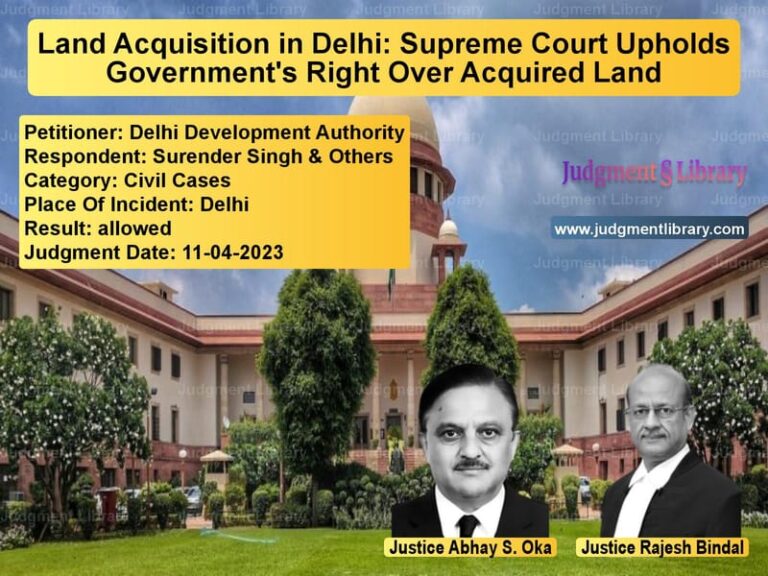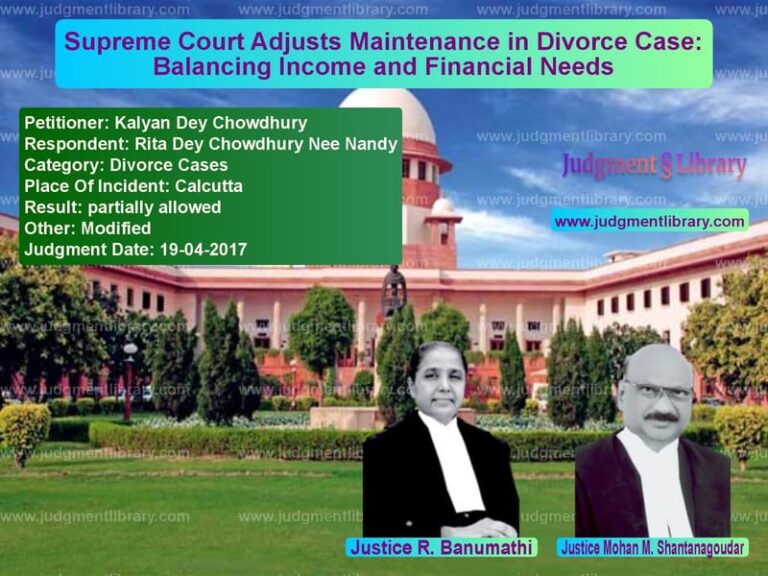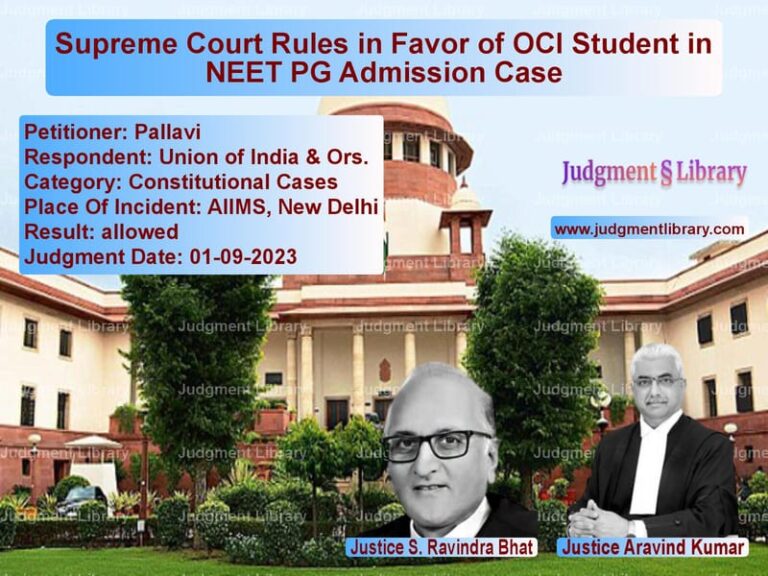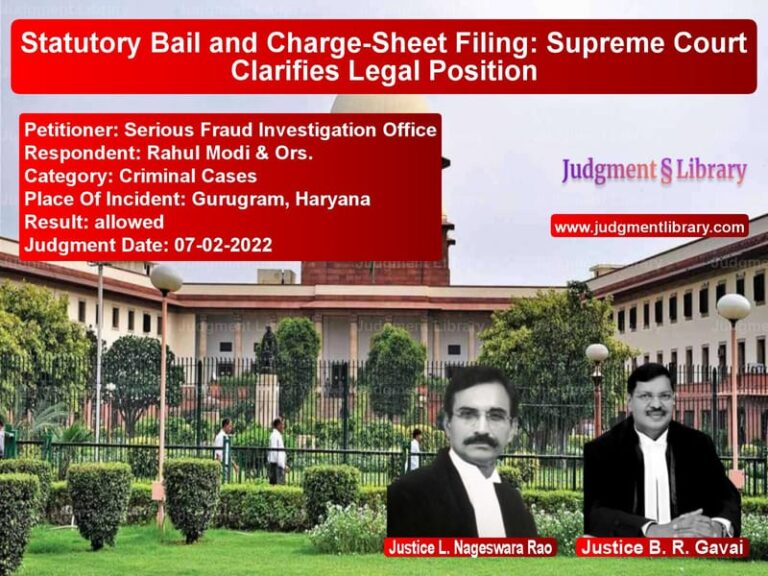Supreme Court Partially Allows Appeal in Dowry Harassment and Suicide Case
The Supreme Court of India, in the case of Kashibai & Ors. vs. The State of Karnataka, delivered a significant judgment concerning dowry harassment and abetment of suicide. The Court partially allowed the appeal, upholding the conviction of the appellants under Section 498A of the Indian Penal Code (IPC) but acquitting them of charges under Section 306 (abetment of suicide) due to lack of conclusive evidence.
Background of the Case
The case revolves around the tragic death of Jayashree, who was married to Chandrashekhar (appellant no. 3) approximately three years before the incident. The appellants, including Chandrashekhar’s parents (appellants nos. 1 and 2), were accused of subjecting Jayashree to mental and physical harassment due to dowry demands, leading to her alleged suicide.
Jayashree’s mother, Annapurna, lodged a complaint at the Bableshwar Police Station, stating that her daughter had committed suicide by jumping into a well on February 7, 2010, around 11:00 AM, due to harassment by her in-laws and husband.
Trial Court and High Court Findings
The Sessions Court convicted and sentenced the appellants under Section 498A (cruelty by husband or relatives) and Section 306 (abetment of suicide) read with Section 34 (common intention) of the IPC. However, it acquitted accused no. 4, Santosh Jangamshetti, the brother-in-law of the deceased, due to lack of evidence.
The Karnataka High Court upheld the conviction and sentence. Aggrieved by the ruling, the appellants approached the Supreme Court.
Arguments by the Appellants
The appellants, represented by their counsel, argued:
“The prosecution failed to prove beyond reasonable doubt that the accused abetted the deceased’s suicide. Several prosecution witnesses turned hostile, weakening the case.”
Additional points raised:
- Key witnesses, including PW-10, PW-11, PW-12, and PW-14, turned hostile and did not support the prosecution’s case.
- The prosecution relied mainly on PW-1 and PW-4 (parents of the deceased) and PW-6 (her uncle), who testified about dowry demands and harassment.
- None of the witnesses provided direct evidence linking the accused to abetment of suicide.
Arguments by the Respondent (State of Karnataka)
The State of Karnataka opposed the appeal, arguing:
“The deceased was subjected to cruelty, and evidence suggests that the harassment drove her to commit suicide.”
Key prosecution arguments:
- Jayashree faced continuous physical and mental harassment for dowry.
- PW-5, who helped arrange the marriage, testified that additional dowry demands were made after the wedding.
- Neighbors PW-7 and PW-9 also supported the claim that Jayashree was harassed.
Supreme Court’s Observations
The Supreme Court analyzed Sections 306 (abetment of suicide) and 107 (abetment) of the IPC and held:
“To convict a person under Section 306 IPC, the prosecution must prove that the accused instigated or intentionally aided the deceased in committing suicide.”
Key findings:
- The post-mortem report indicated death due to drowning, but it did not confirm whether it was suicide or accidental.
- None of the witnesses provided conclusive proof that the accused instigated the suicide.
- PW-1 (mother) initially claimed Jayashree was murdered but later admitted she had not seen the body in the well.
- PW-21 (doctor) did not establish that the death was suicidal.
- As per Section 113A of the Evidence Act, suicide within seven years of marriage raises a presumption of abetment, but the Court ruled that the presumption was discretionary and not automatic.
Final Judgment
The Supreme Court ruled:
- The conviction under Section 498A was upheld as there was sufficient evidence of cruelty and dowry harassment.
- The conviction under Section 306 was set aside due to lack of clear evidence of abetment.
- Since the appellants had already served their two-year imprisonment under Section 498A, they were ordered to be released immediately.
Implications of the Judgment
This ruling has far-reaching implications for cases involving dowry harassment and suicide:
- Burden of Proof in Abetment Cases: Mere harassment does not automatically establish abetment of suicide. The prosecution must prove instigation or direct involvement.
- Importance of Witness Credibility: When key witnesses turn hostile, courts must rely on remaining evidence carefully.
- Legal Protection for Accused: The Court reinforced that wrongful convictions under Section 306 must be avoided unless clear evidence exists.
Conclusion
The Supreme Court’s judgment in Kashibai & Ors. vs. The State of Karnataka highlights the delicate balance in dowry-related suicide cases. While upholding the conviction for cruelty under Section 498A, the Court ensured that accusations of abetment under Section 306 require solid proof. This ruling serves as an important precedent in determining culpability in cases of alleged abetment of suicide.
Read also: https://judgmentlibrary.com/supreme-court-denies-cbi-probe-in-ndps-case-a-detailed-analysis/
Petitioner Name: Kashibai & Ors..Respondent Name: The State of Karnataka.Judgment By: Justice Ajay Rastogi, Justice Bela M. Trivedi.Place Of Incident: Karnataka.Judgment Date: 28-02-2023.
Don’t miss out on the full details! Download the complete judgment in PDF format below and gain valuable insights instantly!
Download Judgment: kashibai-&-ors.-vs-the-state-of-karnata-supreme-court-of-india-judgment-dated-28-02-2023.pdf
Directly Download Judgment: Directly download this Judgment
See all petitions in Dowry Cases
See all petitions in Domestic Violence
See all petitions in Suicide Cases
See all petitions in Judgment by Ajay Rastogi
See all petitions in Judgment by Bela M. Trivedi
See all petitions in partially allowed
See all petitions in supreme court of India judgments February 2023
See all petitions in 2023 judgments
See all posts in Criminal Cases Category
See all allowed petitions in Criminal Cases Category
See all Dismissed petitions in Criminal Cases Category
See all partially allowed petitions in Criminal Cases Category







